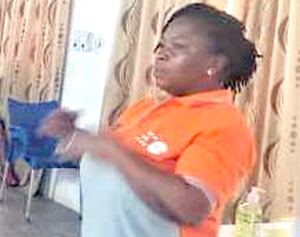Georgina Aberese-Ako
Stakeholders have been encouraged to intensify discussions on Female Genital Mutilation (FGM) in order to end the practice in the country.
According to a recent report by the United Nations Population Fund (UNFPA) FGM is still being practiced in Ghana, with the Upper East Region accounting for 13.2 percent of the total cases recorded in Ghana in 2021.
The Upper West Region also accounted for 32.5 percent, thereby placing the two regions at the top of regions practicing FGM as at 2021.
The Country Representative of UNFPA, Niyi Ojualape, said over 200 million females have undergone FGM and living with the scars globally, while 4 million females are at the risk of undergoing the practice annually.
The Upper East Regional Director of the Department of Children, Georgina Aberese-Ako in an interview on A1 Radio and monitored by Daily Guide, confirmed that there are indications that Female Genital Mutilation has not been eradicated in the region.
She said some females living at Pusiga, Bawku and some smaller communities that share borders with Burkina-Faso and Togo are victims to the practice.
She was worried about the continuous believe in the supposed cultural and social benefits of FGM, adding that, it sounds more worrying to hear that families either lure or force their females to travel from communities in Ghana to communities in Togo and Burkina-Faso to get their genitals mutilated and then return to their communities as though nothing has happened.
“Some years ago, the Gender Ministry, then under the leadership of Otiko Djaba, hosted a stakeholder meeting where participants from Ghana, Burkina-Faso and Togo attended to brainstorm on how to end FGM in the participating countries, as well as stopping cross border practice. It is possible that even in those counties the perpetrators hide to practice FGM,” she said.
According to Madam Aberese-Ako, some time ago, the Ghana Health Service (GHS) as part of its measures to help fight FGM in the region, began inspecting genitals of babies girls that are brought to health facilities, unfortunately, women and families stopped taking their babies for weighing and vaccinations.
“It is possible that women and families that refused to take their baby girls to the health centres, may have mutilated their genitals already or they intend to do that. It is a worrying situation, because people know the long-term effects of FGM.
All hands must be on deck to intensify the campaign against FGM in this region, one the day they will understand what we are saying and will stop, she urged.
FROM: Ebo Bruce-Quansah, Bolgatanga


